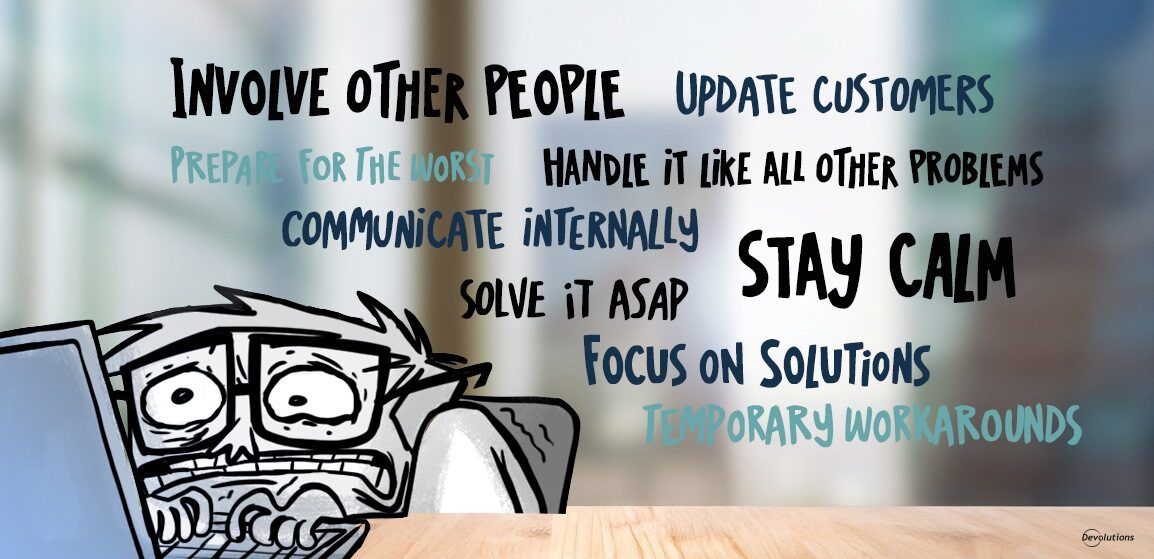A Japanese proverb says, “Fall seven times, stand up eight.” And then there is Winston Churchill’s stormier version of the same advice: “If you’re going through hell, keep going.”
Yes, we are referring to those times in life when things don’t merely fail to go as planned — they pretty much lay waste to whatever plans we had, and replace them with chaos, confusion, and conflict. In other words, we are hit with a crisis and forced dig deep, work hard, and go far outside of our comfort zone in order to “stand up” and “keep going.”
This paradigm was the framework for our unique April poll question, which asked: How do you handle a workplace crisis that isn’t your company’s fault?
We invite you to click the link above if you wish to discover or recall the crisis here at Devolutions that prompted the April poll question.
In today’s article, we will shine the spotlight on the people who matter most to us: YOU, the brilliant members of our global community. Below, we summarize your best advice for handling a workplace crisis that isn’t your fault, but nevertheless is one that you and your team must rapidly and effectively address.
Before moving on, we just want to mention that we were extremely impressed and inspired by your thoughtful advice. You should all feel empowered to add “crisis management” to your long list of professional skills!
Your 3 c’s of crisis management: Calm, communicate, and change
In reviewing and analyzing your (fantastic) responses, three key themes emerged as the most vital for addressing a crisis. We will call these the “3 c’s”: stay CALM, COMMUNICATE effectively, and be open to CHANGE.
Stay CALM
Nobody wants to deal with a crisis; especially one that isn’t your fault! But if a crisis erupts, then over-reacting, or going into denial mode (“Crisis? What crisis?”) only makes things worse. What matters most at the outset is realizing that the best — and only — way forward is by taking targeted, deliberate, and measured action. And if a third-party vendor is involved, staying calm also ensures that everyone remains completely focused on facts and solutions, instead of possibly getting offended and defensive.
Community member CyberInferno offered excellent advice in this area: “It's critical to work with the vendor using an assertive tone but without being angry, condescending, etc. You're at their mercy to an extent, so it should be both of you working together towards a solution rather than you yelling at them and them working on it.”
COMMUNICATE effectively
Many of you also pointed out that effective communication is pivotal, and that all relevant stakeholders must be part of the communication effort. This could include one or multiple vendors, leaders, and subject matter experts, and affected users (internal and/or external). You also said that everyone should be given the opportunity to be part of the solution — which can yield surprisingly beneficial insights and outcomes.
As community member Dan pointed out: “Involve other people. Sometimes a question or comment about something that others think is unrelated will lead you to the correct solution.”
Communicating effectively also means being transparent, and providing applicable stakeholders with ongoing updates. As we mentioned when we published the April poll question, for our crisis here at Devolutions this is an area where our vendor fell far short of expectations. Obviously, it can take time — hours, days, weeks, or even sometimes months — to completely solve a crisis, and prevent it from happening again. But communication MUST be open and ongoing. Silence is not an option.
We loved what community member Ron said about this: “In every crisis, one should stay calm and think rationally. Then start to pick up the problem pragmatically. If it's out of one's control, then communicate clearly and regularly to the stakeholders.”
Be open to CHANGE
Of all three pillars in this “3’s of Crisis Management” model, this is the hardest (which is saying a lot, because the other two are pretty tough!). Sometimes in a crisis, what we want most is for things to go back to the way they were. This is rational and understandable — but it can also be impossible.
For a variety of reasons that can vary from crisis to crisis, there may be no way to reset things to pre-crisis mode. To put things in IT-speak: there may not be a reliable backup to restore! This is when it is absolutely essential to be open the change, and willing to adjust and embrace a new normal — one that may ultimately prove to be far better than its predecessor. Here at Devolutions, we can attest to the truth of this, as we are making post-crisis adjustments that will put us and our Devolutions Force users in a MUCH better position going forward.
Community member Ffournier nailed the importance of this attitude and approach: “Have a flexible, or growth, mindset. Having one (the belief that you are in control of your own ability and can learn and improve) is the key to success, finding solutions to fix the issue and preventing them from happening again.”
Other pearls of crisis management wisdom
The 3C’s — stay CALM, COMMUNICATE effectively, and be open to CHANGE — captured (in one way or another) most of the responses. However, there were some other pieces of great advice that we wanted to pass along as well, including:
- Be willing to compromise and implement workarounds if it means moving forward towards a solution; even a temporary one. As the saying goes: “Don’t let the perfect become the enemy of the good.”
- Placing blame in the midst of a crisis does not fix anything.
- Take care of yourself.
- Seek support and guidance. Surround yourself with loyal, competent people who can put things into perspective.
The winners are…
To start with, you’re ALL winners if have the resilience, the courage — and as community RM sagely points out, the coffee! — you need to deal with a workplace crisis that you didn’t cause, but one that you nevertheless need to play a key role in addressing and solving. Is this fair? No! But it this how life goes sometimes? Yes!
Now, it’s time to reveal the two lucky poll participants who have been randomly selected to win a $25 Amazon gift card. Congratulations to crisis management extraordinaires Simon Smith and James Pope! Please email me at lcadieux@devolutions.net to claim your prize.
Thank you again to everyone who participated in the unique April poll, and for making it one of the most interesting and instructive ever!




